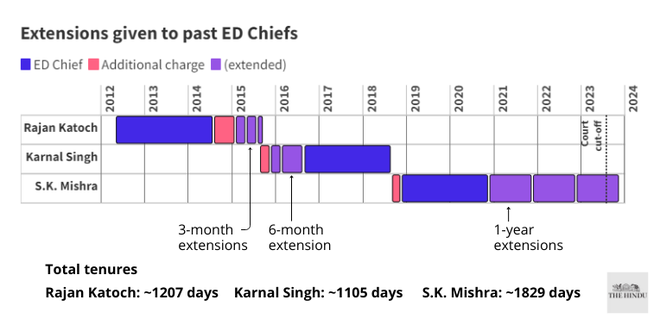The Supreme Court on Wednesday agreed to hear on July 27 an urgent application moved by the Centre to allow Enforcement Directorate (ED) Director Sanjay Kumar Mishra to continue in office till October 15.
A Supreme Court judgment on July 11 had directed him to quit office by July 31. The top court had concluded that Mr. Mishra’s continuance at the helm of the ED on his third consecutive extension, till November 2023, was illegal.
However, the court, on July 11, had given the government time till July 31 to find a replacement for Mr. Mishra. The leeway was given by the court taking into consideration the government’s submission that Mr. Mishra’s presence was necessary for the ongoing evaluation by the Financial Action Task Force (FATF).
On Wednesday, appearing before a Bench headed by Justice B.R. Gavai, Solicitor General Tushar Mehta, for the Centre, sought an urgent listing of its application seeking the extension of Mr. Mishra’s tenure from July 31 to mid-October, 2023.
Also Read | Why did you give Sanjay Kumar Mishra third extension: Sibal on Amit Shah’s remark
The 12-page application filed on Wednesday said the “Union of India is compelled to approach the Supreme Court seeking extension of the tenure of Mr. Mishra up to October 15, 2023 in view of the ongoing FATF review which is at a critical stage”.
Money laundering investigations
It said the submissions on effectiveness of the anti-money laundering regime in India were made on July 21 and an on-site visit by an FATF assessment team was scheduled in November.

“At such a critical juncture, it is essential to have an individual who is well-acquainted with the overall status of money laundering investigations and proceedings across the country and also of the intricacies of the procedures, operations and activities of the investigating agency, at the helm of affairs at the ED,” the Centre’s application submitted.
It said Mr. Mishra’s continuation would be pivotal to ably assist the assessment team with “necessary reports, information, statistics, etc”.
“Any transition in leadership at the ED at this stage would significantly impair the ability of the agency to provide necessary assistance to and cooperation with the assessment team and thereby adversely impact India’s national interests,” the Centre urged.
The Centre had earlier argued that the ED Director was not a promotional post, so nobody was losing a career opportunity due to the extension of Mr. Mishra’s tenure.
Also Read | Pleas challenging tenure extension of ED Director filed for personal motive: Centre in Supreme Court
On Wednesday, Solicitor General Tushar Mehta said the fresh application was meant to “persuade” the court about Mr. Mishra’s tenure extension.
Mr. Mishra is in his fifth year as ED Director.
In its July 11 judgment, the top court had however upheld amendments enacted in 2021 to the Central Vigilance Commission Act, the Delhi Special Police Establishment Act and the Fundamental Rules allowing CBI and ED chiefs a maximum three annual extensions besides their two-year fixed tenures.
The tweaks in the law came shortly after the Supreme Court, in a September 2021 judgment, directed the government to stop giving extensions to Mr. Mishra. The amendments allowed the government to overcome the court’s direction and grant him another two extensions.
Justice Gavai, who authored the July 11 verdict, had reasoned that the extensions were not given at the “sweet will” of the government. Instead, the 2021 amendments required High Level Committees to recommend the officers for service extensions.
A five-member panel composed of the Central Vigilance Commissioner and Vigilance Commissioners had to recommend if an ED Director was worthy of an extension in service. In case of the CBI Director, a High-Level Committee of the Prime Minister, Opposition Leader and the Chief Justice of India had to recommend.
Justice Gavai said the amendments were passed by elected representatives of the people who were “supposed to know and be aware of the needs of the people and what is good and bad for them”.







